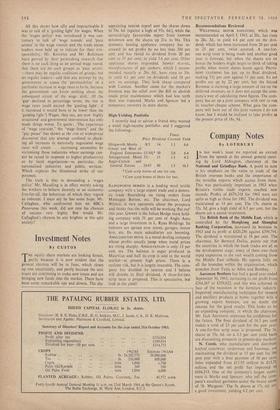and worthwhile agents want to specialise on holidays abroad and
not get caught up in the penny-ante business of general agency. On my finding ABTA look a teeny-weeny bit restrictive. The only expulsion from their ranks that ever came to my notice was of a couple of agents who had offered 'additional inducements' to cus- tomers. A touch of the IATAs.
I take refuge in the new law reports. At home and abroad the same kind of thing. There was Sandbanks hotel Ltd. v. It'allman and Another, which all hinged on the size of a double room. 'It was 15 ft. long and 8 ft. 6 in. wide, and his
Lordship was bound to say that that was not very wide for a room described as a double room. The bed was 4 ft. wide, which seemed small for
a double bed... .' Need I go on? His dear Lord- ship (L. J. Ormcrod) was not prepared to decide as a matter of law that a double bed was not a double bed unless one could walk all round it.
And do you know what happened? Mr. Waltman lost his appeal because their Lordships took the
view that it was a matter of business if the hotel thought it was acting honourably in describing a room in such a way that there might be a misunderstanding.
Now hear this from Lord Justice Upjohn. 'Prospective customers might be warned that although the largest double room at this hotel was twice this size, this was not the smallest of them.' And if this can happen in Bournemouth, is it any .wonder that cries of distress go up from the Costa Brava to the Canaries?
Where The Times (except for its incomparable Law Reports) is up the creek, along with many a distinguished private-enterprise-minded worthy, is in thinking, and for the love of Mike saying, that a travel agent is just another retailer.('how does the shady travel agent differ from an un- scrupulous retailer?' and, Edwardian to a tee, 'any sensible person must be on the alert in dealing with such a tradesman'). What the travel agent is selling can be tested in just two ways. First by reading his own description of his wares in hiS brochures and advertisements. Secondly, by paying up and going. Then if you feel diddled, what can you do? Go back to hi.; shop bearing in a carrier bag two wet weeks in a leaking mud but without sanitation three miles from a sea too cold to bathe in anyway? And collect your cash rebate? No, you go to law, which can cost dear even if you win.
The easiest way round all this for both the honest agent :.ad the holidaymaker who wants a reasonable return on his outlay, which is often a year's hard saving, is registration and a measure of discipline. If you are honest, travel salesmen, what are you afraid of? And what is the Con- sumer Council havering about? in its statement to a press conference last week it gave its sup- port to Edward Milne's Bill, but still failed to come down unequivocally on the side of registra- tion, although they evidently expected to enjoy the debate in the House.
A final point (and I have hundreds more to make): registering travel agents does not raise them to the status of a profession, any more than it raises employment agencies that have to be licensed by the local authority. Even if it did, who cares but the snobs?
I HE Scotch Whisky Association is lighting a con- tinuous battle to persuade foreign governments to prevent the import of immature Scotch (some- times a mere six months old), which can be so easily used, not merely to masquerade (suitably' blended with local firewater) as mature Scotch, but as well-known brands. 1 hey have powers to prevent the use of the word Scotch on locally distilled whiskies (such as DyC in Spain), but it can take as long as a year to bring a prosecu- tion. By which time the imitator merely drops the offending word, having had twelve months in which to establish the name of his brand.


































 Previous page
Previous page